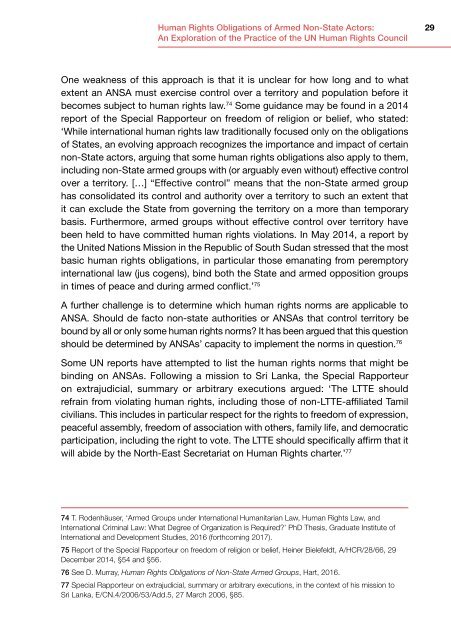InBrief7_web
InBrief7_web
InBrief7_web
Create successful ePaper yourself
Turn your PDF publications into a flip-book with our unique Google optimized e-Paper software.
Human Rights Obligations of Armed Non-State Actors:<br />
An Exploration of the Practice of the UN Human Rights Council<br />
29<br />
One weakness of this approach is that it is unclear for how long and to what<br />
extent an ANSA must exercise control over a territory and population before it<br />
becomes subject to human rights law. 74 Some guidance may be found in a 2014<br />
report of the Special Rapporteur on freedom of religion or belief, who stated:<br />
‘While international human rights law traditionally focused only on the obligations<br />
of States, an evolving approach recognizes the importance and impact of certain<br />
non-State actors, arguing that some human rights obligations also apply to them,<br />
including non-State armed groups with (or arguably even without) effective control<br />
over a territory. […] “Effective control” means that the non-State armed group<br />
has consolidated its control and authority over a territory to such an extent that<br />
it can exclude the State from governing the territory on a more than temporary<br />
basis. Furthermore, armed groups without effective control over territory have<br />
been held to have committed human rights violations. In May 2014, a report by<br />
the United Nations Mission in the Republic of South Sudan stressed that the most<br />
basic human rights obligations, in particular those emanating from peremptory<br />
international law (jus cogens), bind both the State and armed opposition groups<br />
in times of peace and during armed conflict.’ 75<br />
A further challenge is to determine which human rights norms are applicable to<br />
ANSA. Should de facto non-state authorities or ANSAs that control territory be<br />
bound by all or only some human rights norms? It has been argued that this question<br />
should be determined by ANSAs’ capacity to implement the norms in question. 76<br />
Some UN reports have attempted to list the human rights norms that might be<br />
binding on ANSAs. Following a mission to Sri Lanka, the Special Rapporteur<br />
on extrajudicial, summary or arbitrary executions argued: ‘The LTTE should<br />
refrain from violating human rights, including those of non-LTTE-affiliated Tamil<br />
civilians. This includes in particular respect for the rights to freedom of expression,<br />
peaceful assembly, freedom of association with others, family life, and democratic<br />
participation, including the right to vote. The LTTE should specifically affirm that it<br />
will abide by the North-East Secretariat on Human Rights charter.’ 77<br />
74 T. Rodenhäuser, ‘Armed Groups under International Humanitarian Law, Human Rights Law, and<br />
International Criminal Law: What Degree of Organization is Required?’ PhD Thesis, Graduate Institute of<br />
International and Development Studies, 2016 (forthcoming 2017).<br />
75 Report of the Special Rapporteur on freedom of religion or belief, Heiner Bielefeldt, A/HCR/28/66, 29<br />
December 2014, §54 and §56.<br />
76 See D. Murray, Human Rights Obligations of Non-State Armed Groups, Hart, 2016.<br />
77 Special Rapporteur on extrajudicial, summary or arbitrary executions, in the context of his mission to<br />
Sri Lanka, E/CN.4/2006/53/Add.5, 27 March 2006, §85.


